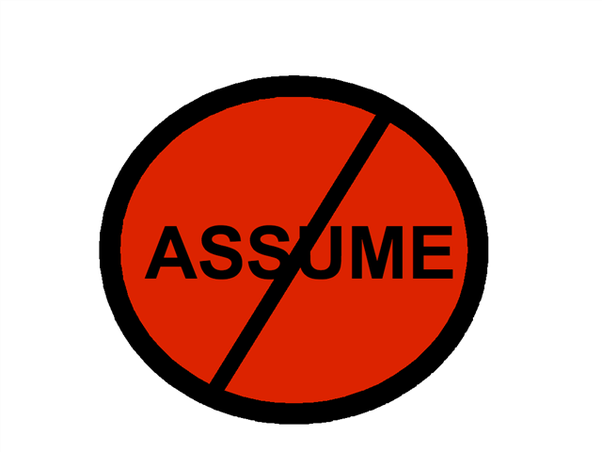
At some point during middle school I remember learning the importance of avoiding assumption from a teacher. “When you assume”, she said, “you make an ass out of you and me”. While explaining the concept, she divided the word into three: ASS, U, & ME. At this age, most of the group just chuckled and moved on to the next topic disregarding what an important life lesson we had just been awarded.
As judgmental humans, we tend to make assumptions on a daily basis regarding ourselves and those who surround us. Sometimes we create fictional and unrealistic mental stories and justifications for other people’s actions and emotions in order to attempt to understand them, or soothe and protect ourselves. These assumptions however, are clearly based on what we predict about others and most times, have little to do with reality. We assume we know what our coworkers, friends, family members, partners and even pets think and feel, because we associate our own feelings as being universal to all. The way we understand and connect with others through emotion has, without a doubt, a profound implication on everything in our lives, therefore the importance of learning how to become emotionally intelligent, detached and self-sufficient is key to living a happier life.

According to an article in Northeastern University’s magazine, the notion that emotions are inborn, universal and have a direct impact on everything we deal with in our lives, has officially been dismissed. Lisa Feldman Barrett, who is a psychology professor and iconoclast theory researcher, states that the brain is “a predictive machine wired by cultural training and personal experience”. In other words, our brains have been shaped to accommodate to our social environment and become the product of our own cultural baggage. After researching the topic for 20 years, Feldman Barrett further explains the notion: “An infant brain is not a miniature adult brain. It’s a brain that awaits wiring instructions from the world.”
This said, neither our brains nor our emotions are universal, generic or understood and expressed cross-culturally. While living in Poland as a PhD student, I remember frequently smiling to strangers on the street or on the tram. Surprisingly, hardly anyone smiled back and, as a reaction, I began assuming and trying to decipher Polish behavior in my mind. As a Puerto Rican, I was taught that smiling is a way of breaking the ice or the awkward moment when someone you don’t know glances at you. In Poland on the other hand, smiling at someone you don’t know is generally avoided because it is associated with strange behavior, dishonesty, or wanting something in exchange. In order to adapt to this new culture, I had to de-learn to react to these awkward moments with a smile after assuming for a while that Poles were simply closed-minded, cold, and non-affectionate people. Initially, I also assumed Poles would react in the same way as I would and smile back, even though our cultural contexts are completely different. And this assumption, which later led me to disillusion, clearly affected my emotions too.
ASSUMING CREATES A FAKE REALITY WHICH LEADS TO DISAPPOINTMENT AND BLOCKAGE.
Professor Feldman Barrett says: “The classical view of emotion assumes that even though etiquette varies from culture to culture, human emotions are universal.” However, this isn’t the case, because “emotions stem from predictions based on personal and cultural experience.”
Why is this even important? I think the point behind all of this theory that disassociates the brain and emotions with being predictive and universal, is that in order to understand each other in a more efficient and practical manner, as well as avoid disappointment, we must stop making assumptions and start communicating. Although emotions are not universal, words are our best tool (maybe our only one) for developing links and understanding others. Even though we assume and think others feel like we do, communication is the only key to unveiling our true intentions. Hence, “to improve interpersonal relationships, we have to give up the certainty that we know how other people feel. Our brains are always guessing, even when we feel sure”, explains Feldman Barrett.
This said and considering the upcoming lunar eclipse of the 31st of January, which emotionally tends to shake many and block others, may we start communicating more and assuming less in order to have healthier and more stable relationships with others, as well as enjoy greater mental stability and happiness. So next time, instead of assuming, opt for asking.

For more information about Prof. Lisa Feldman Barett and her book How Emotions are Made, click here.


Deja un comentario